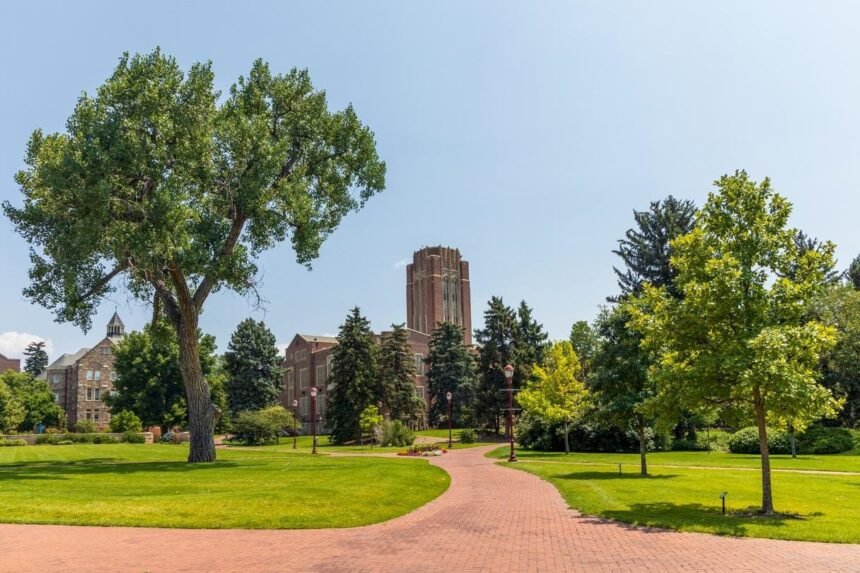Faculty at the University of Denver have cast a vote of no-confidence in Chancellor Jeremy Haefner.
Faculty members at the University of Denver have voted that they have no confidence in Chancellor Jeremy Haefner, according to The Denver Post, which first reported the results of the vote on Wednesday.
A total of 822 full-time faculty were eligible to vote anonymously on the no-confidence question in an online poll conducted between June 12 and 26, according to the Post, citing former DU Faculty Senate President Dean Saitta. Saitta had previously stepped down from that position out of his concerns about the wisdom of a no-confidnce vote.
Seventy percent of eligible faculty participated, with 56% voting in favor of the no-confidence resolution, while 37% voted against it, and 7% abstained.
Over the course of the year, several department chairs and faculty in some of DU’s individual colleges had also passed no-confidence votes against the chancellor.
And on June 4, the DU Faculty Senate voted to support a motion of no confidence in Haefner, citing misguided financial priorities, lack of a shared vision, and top-down decision making as justifications. Of the 83 senators submitting votes at the June meeting, 58% voted yes, 35% voted no and 7% abstained, according to The Denver Clarion, DU’s student newspaper.
That senate motion set the stage for conducting the online vote on whether the full faculty had confidence in the chancellor.
The University of Denver has faced a recent financial deficit, due, in part, to declining enrollment, forcing it to make budget cuts and lay off staff; and the faculty vote sounds a familiar refrain heard in many no-confidence votes against college presidents.
In our forthcoming book No-Confidence: When College Faculty Turn Against Their Presidents, Chuck Ambrose and I found that while the reasons for no-confidence votes vary from institution to institution, one of the most common scenarios is faculty displeasure with academic restructuring and budget reductions directed by campus heads.
Throughout the process, the DU Board of Trustees has voiced its strong support for Haefner. For example, it presented a statement at the June 5 meeting of the Faculty Senate, offering several examples of “why Chancellor Haefner has earned the full support of the Board of Trustees, and it unanimously passed a resolution affirming its “full, unwavering, and public confidence in Jeremy Haefner as chancellor, recognizing his integrity, strategic acumen, and dedication to the University’s mission and values.”
Citing the challenging times that higher education is facing, the Board said that DU needed “strategic, passionate leaders capable and willing to make difficult decisions that best benefit the University, its students, faculty, and staff, and empower the institution to achieve its mission. This is precisely what we’ve seen, and continue to see, from Chancellor Haefner. We remain highly confident he is the exact right leader to usher DU through the challenges we face and guide our University forward.”
The Board also voiced its concerns to the faculty senate about the harm to the university that a no-confidence vote could cause. “Such a vote can disrupt our campus community, distract us from our primary mission of serving our students, and wreak havoc on our public reputation. At a time when we are already struggling with enrollment challenges given the headwinds facing higher education, this is not a benign influence.”
The Board also said it was committed to “shared governance, and to even greater transparency and collaboration with you, our faculty leaders, and all in the DU community. As a case in point, the Board is moving to formalize the faculty-trustee liaison committee recently proposed by Faculty Senate Chair Dean Saitta.”
Despite those appeals, the trustees failed to dissuade the majority of faculty who took part in the poll from voting no confidence in Haefner’s leadership.
DU spokesperson Jon Stone told the Post that the Board of Trustees “maintains its unanimous support of and trust in Chancellor Jeremy Haefner.”
“The recent vote by members of the faculty signifies how deeply they care about the university’s future during one of the most challenging times in the history of higher education,” Stone said in a statement. “…The chancellor and board are committed to working with all faculty, staff and students to ensure a strong and enduring future for the university. ”
Haefner, a mathematician by training, was named DU’s 19th chancellor in 2019. He had previously served as the univeersity’s provost and executive vice chancellor. Prior to that, he had been provost and senior vice president for academic affairs at Rochester Institute of Technology and dean of engineering and applied science, associate vice chancellor for research and dean of the graduate school at the University of Colorado at Colorado Springs.
According to the Post, Haefner sent a message to the campus following the vote, expressing his commitment to “engage with the community, to listen and to work collaboratively and constructively to make the university stronger, especially given the many challenges that institutions across the country are currently facing.”











